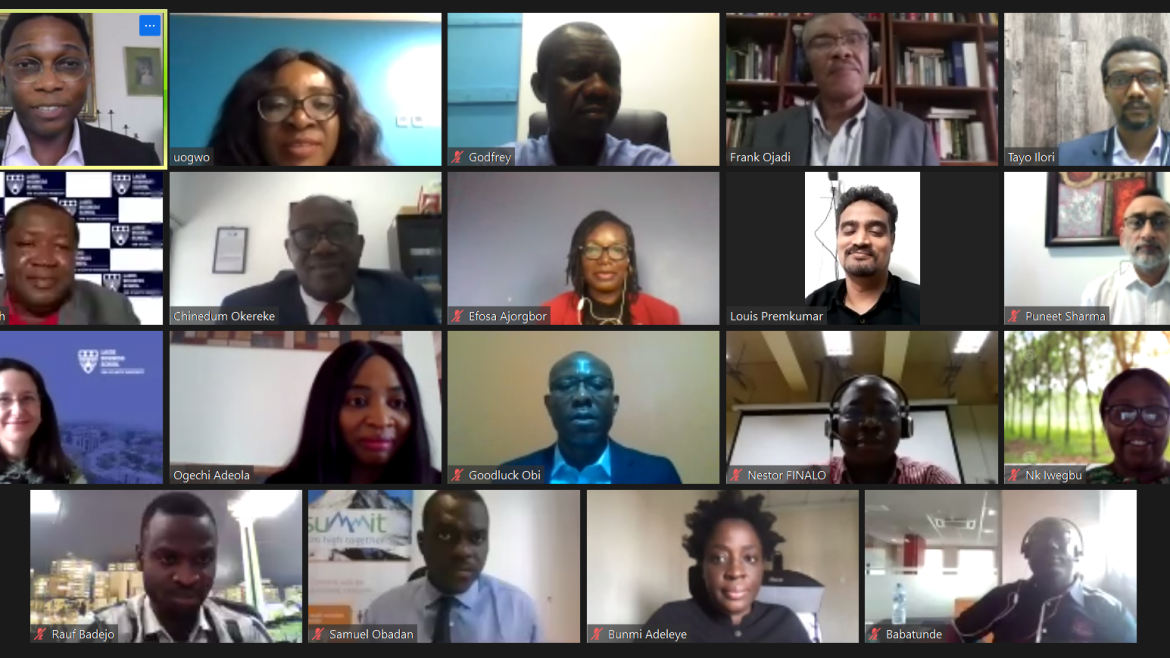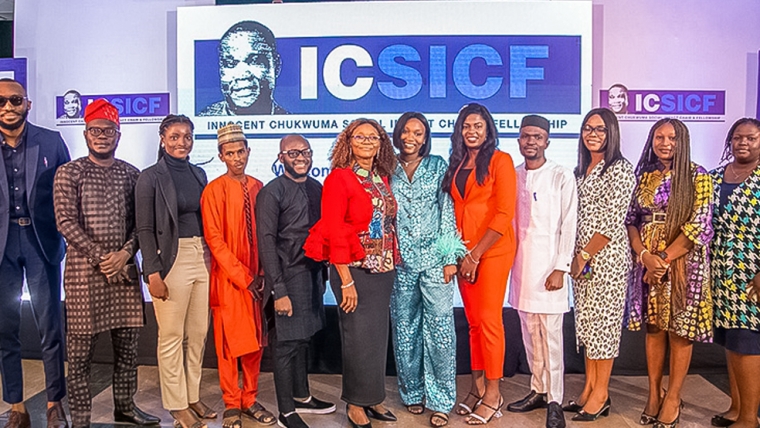On Tuesday, September 29, 2020, Lagos Business School hosted select top Fast Moving Consumer Goods (FMCG), Finance & Supply Chain executives in a closed online interactive session.
The session provided a platform to exchange ideas, network and discuss the latest trends, challenges and opportunities in finance and supply chain, especially considering the prevalent turbulence in the operating environment.
Strategy faculty, Chidi Okoro gave the opening remarks as he spoke on the importance of supply chain and finance to the health and sustenance of organisations. Operations Management faculty, Dr Frank Ojadi and the Managing Director of the LaCasera Company, Chinedum Okereke moderated the 2-hour session.
The keynote address was delivered by Dr Goodluck Obi, Partner & Head Consumer Markets, Audit Services, KPMG. In his presentation, Obi focused on the macroeconomic review, lessons from FMCGs and the post COVID-19 outlook for supply chain and finance.
According to data gathered, following the lockdown measures, Nigeria’s Business Confidence Index fell for the first time to a negative index of 66.2 in May 2020. It remained negative until July, showing a loss of confidence amongst business owners. Business owners in the manufacturing construction and Agri/services sector contributed to the pessimism in July 2020 (-2.9, -0.5 and -4.8 respectively). However, a positive index of 33.7 in August 2020 indicates an optimistic outlook of the economy, and this is expected to continue in Q4 2020.
Obi highlighted the major challenges faced by organisations during the lockdown and the management actions implemented. He said, “Most companies battled with cash collections from key customers, increased impairment losses on key customer accounts, increase in average collection period and amongst others. In dealing with these challenges, most firms had to take swift management actions. Many firms required bank guarantees from new customers, increased monitoring of their daily and weekly cash flow collections, sourced local raw materials to reduce dependence on foreign-based inputs and restructured the procurement and supply chain departments to respond to the new threats.” Obi added that the increase in the adoption of technology and digitisation is critical for the FMCG sector post-COVID-19.
The session was attended by Senior Manager, Supply Chain, WAMCO, Samuel Obadan; Finance Director, Reckitt Benckiser, Shekar Poojari; Group CFO and Head of Supply Chain at TGI Distri, West African Cubes, and Chi Pharmaceutical, Puneet Sharma. Other are; Head of Supply Chain, DUFIL Prima Foods, Pankaj Jajoo; Finance Director, the Lacasera Company, Godfrey Iriso; Head Supply Chain, Honeywell Flour Mills, Tayo Ilori; Head of Operations & Supply Chain, The Lacasera Company, Louis Premkumar; Supply Chain Director, Guinness Nigeria, Ngozi Aghomi; Head of Planning, Hayat Kimya Nigeria, Ugo Ogwo; Chief Financial Officer, UAC Group, Ibikunle Oriola; GM Finance, PZ Cusson, Babatunde Oni; Supply Chain Lead, Nestle, Nestor Finalo and the Managing Director, TGI Distri Limited, Sunil Sawhney.
Also contributing to the session were LBS Faculty Chidi Okoro, Strategy; Dr Ogechi Adeola, Sales and Marketing; Vanessa Burgal, Marketing; Dr Obinna Muogboh, Operations; and Dr Arinze Nwokolo, Finance.
The executives and LBS faculty shared insights on the management of supply chain disruption and higher cost of imported raw materials due to the pandemic. The discussion also highlighted the avenues of strengthening supply chains through credit policy; cash management and capital requirement post-pandemic.
Chief Financial Officer, UAC Group, Ibikunle Oriola shared the steps his company took to strengthen their working capital position. According to him, his firm conducted a stress test of their businesses for vulnerability. He stated, “What became very clear was liquidity and cash was critical to maintaining operations for many of the businesses. We decided to conserve cash as the duration of the lockdown was not yet clear.”
Chi Pharmaceutical’s Puneet Sharma also shared how his organisation leveraged innovation to ensure the running of their operations, sourced raw materials locally due to the travel bans, and strengthened relationships with customers which determined how they managed inventory.
Supply Chain Director of Guinness Nigeria, Ngozi Aghomi spoke on how her firm managed inventory during the lockdown. She shared how their stock policy was revamped before the lockdown to hold more raw materials than usual, which cushioned the impact of the pandemic.
The executives concluded with an agreement on the essentiality of data for a dynamic route-to-market for business across several industries.
The interactive session is the second in the series; the first was conversations with top FMCG marketing and sales leaders across industries. Lagos Business School remains committed to positively impacting the professional standards of business management in Nigeria and Africa.




